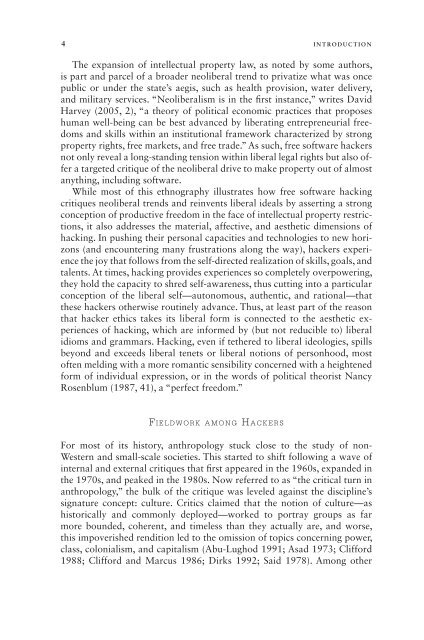V2TXZi
V2TXZi
V2TXZi
Create successful ePaper yourself
Turn your PDF publications into a flip-book with our unique Google optimized e-Paper software.
4 INTRODUCTION<br />
The expansion of intellectual property law, as noted by some authors,<br />
is part and parcel of a broader neoliberal trend to privatize what was once<br />
public or under the state’s aegis, such as health provision, water delivery,<br />
and military services. “Neoliberalism is in the � rst instance,” writes David<br />
Harvey (2005, 2), “a theory of political economic practices that proposes<br />
human well- being can be best advanced by liberating entrepreneurial freedoms<br />
and skills within an institutional framework characterized by strong<br />
property rights, free markets, and free trade.” As such, free software hackers<br />
not only reveal a long- standing tension within liberal legal rights but also offer<br />
a targeted critique of the neoliberal drive to make property out of almost<br />
anything, including software.<br />
While most of this ethnography illustrates how free software hacking<br />
critiques neoliberal trends and reinvents liberal ideals by asserting a strong<br />
conception of productive freedom in the face of intellectual property restrictions,<br />
it also addresses the material, affective, and aesthetic dimensions of<br />
hacking. In pushing their personal capacities and technologies to new horizons<br />
(and encountering many frustrations along the way), hackers experience<br />
the joy that follows from the self- directed realization of skills, goals, and<br />
talents. At times, hacking provides experiences so completely overpowering,<br />
they hold the capacity to shred self- awareness, thus cutting into a particular<br />
conception of the liberal self— autonomous, authentic, and rational— that<br />
these hackers otherwise routinely advance. Thus, at least part of the reason<br />
that hacker ethics takes its liberal form is connected to the aesthetic experiences<br />
of hacking, which are informed by (but not reducible to) liberal<br />
idioms and grammars. Hacking, even if tethered to liberal ideologies, spills<br />
beyond and exceeds liberal tenets or liberal notions of personhood, most<br />
often melding with a more romantic sensibility concerned with a heightened<br />
form of individual expression, or in the words of political theorist Nancy<br />
Rosenblum (1987, 41), a “perfect freedom.”<br />
F IELDWORK AMONG HACKERS<br />
For most of its history, anthropology stuck close to the study of non-<br />
Western and small- scale societies. This started to shift following a wave of<br />
internal and external critiques that � rst appeared in the 1960s, expanded in<br />
the 1970s, and peaked in the 1980s. Now referred to as “the critical turn in<br />
anthropology,” the bulk of the critique was leveled against the discipline’s<br />
signature concept: culture. Critics claimed that the notion of culture— as<br />
historically and commonly deployed— worked to portray groups as far<br />
more bounded, coherent, and timeless than they actually are, and worse,<br />
this impoverished rendition led to the omission of topics concerning power,<br />
class, colonialism, and capitalism (Abu- Lughod 1991; Asad 1973; Clifford<br />
1988; Clifford and Marcus 1986; Dirks 1992; Said 1978). Among other


